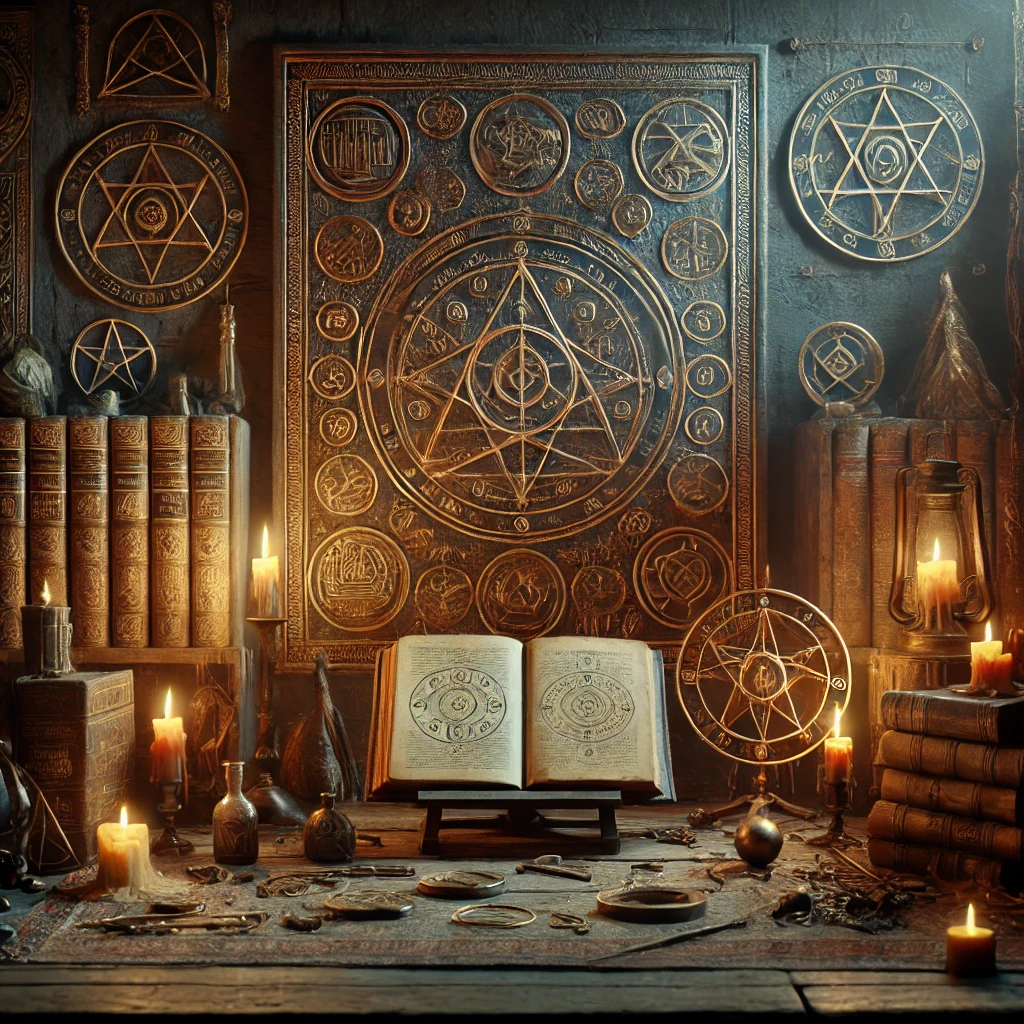Occult and Mysticism

Introduction
Occult and mysticism encompass a wide range of beliefs and practices that seek to explore hidden or esoteric aspects of reality. These traditions often involve the pursuit of spiritual knowledge, personal transformation, and the manipulation of unseen forces. While the terms "occult" and "mysticism" are sometimes used interchangeably, they have distinct connotations: the occult typically refers to hidden knowledge and magical practices, while mysticism emphasizes direct personal experience of the divine or transcendent.
Historical Overview
The history of occult and mystical practices spans many cultures and time periods:
- Ancient Civilizations: In ancient Egypt, Greece, and Rome, occult practices included astrology, alchemy, and divination.
- Medieval and Renaissance Europe: The rise of alchemy, Hermeticism, and Kabbalah, along with the persecution of witches and heretics.
- Modern Era: The 19th and 20th centuries saw the revival of interest in occultism and mysticism, with the emergence of new movements such as Theosophy and the Golden Dawn.
Major Traditions and Practices
Key traditions and practices in the occult and mystical spheres include:
- Alchemy: The ancient practice of transforming base metals into gold and seeking the philosopher's stone, symbolizing spiritual transformation.
- Astrology: The study of celestial bodies and their influence on human affairs, with roots in ancient Mesopotamian and Greco-Roman traditions.
- Divination: Techniques such as tarot reading, scrying, and rune casting used to gain insight into the future or hidden aspects of the present.
- Witchcraft and Wicca: Practices involving the use of spells, rituals, and the veneration of nature, with a modern revival in the form of Wicca.
- Hermeticism: A philosophical and religious tradition based on writings attributed to Hermes Trismegistus, emphasizing the interconnectedness of all things.
- Kabbalah: A Jewish mystical tradition that explores the nature of God, creation, and the soul through the study of esoteric texts and symbols.
Key Figures
Notable figures in the history of occult and mysticism include:
- Aleister Crowley: An influential occultist known for his role in founding Thelema and his writings on ceremonial magic.
- Madame Blavatsky: Co-founder of the Theosophical Society, which sought to synthesize Eastern and Western spiritual traditions.
- John Dee: A Renaissance polymath and advisor to Queen Elizabeth I, known for his work in alchemy, astrology, and Enochian magic.
- Eliphas Levi: A French occultist whose writings helped shape modern Western occultism.
- Dion Fortune: A British occultist and author who contributed to the development of modern magical practices and the study of psychic phenomena.
Occult Societies and Secret Orders
Several societies and orders have played significant roles in the development and dissemination of occult knowledge:
- The Rosicrucians: A secretive order purportedly founded in the early 17th century, claiming to possess esoteric wisdom passed down from ancient times.
- The Golden Dawn: A late 19th-century magical order that had a profound influence on modern occultism, with members such as Aleister Crowley and W.B. Yeats.
- Freemasonry: A fraternal organization with roots in medieval stonemason guilds, incorporating esoteric symbolism and rituals.
- Thelema: A religious and philosophical system developed by Aleister Crowley, centered on the principle of "Do what thou wilt."
Mysticism in World Religions
Mystical traditions exist within many of the world's major religions:
- Christian Mysticism: Practices and beliefs emphasizing direct personal experience of God, exemplified by figures such as St. John of the Cross and Meister Eckhart.
- Islamic Mysticism (Sufism): The inner, mystical dimension of Islam, focusing on the direct experience of God through practices such as dhikr (remembrance) and the teachings of Sufi masters like Rumi.
- Jewish Mysticism: Encompassing Kabbalah and other esoteric traditions that explore the nature of God, creation, and the soul.
- Hindu Mysticism: Practices such as yoga and meditation aimed at achieving union with the divine, as described in texts like the Bhagavad Gita and the Upanishads.
- Buddhist Mysticism: Meditation practices and teachings aimed at achieving enlightenment and understanding the nature of reality, as exemplified by figures like Milarepa and Padmasambhava.
Modern Occult and Mystical Movements
Contemporary movements continue to explore and expand upon traditional occult and mystical practices:
- New Age Movement: A broad spiritual movement that emerged in the late 20th century, drawing on various esoteric traditions and emphasizing personal transformation and holistic health.
- Neopaganism: A modern revival of ancient pagan practices, including traditions such as Wicca, Druidry, and Heathenry.
- Chaos Magic: A contemporary magical practice that emphasizes personal experimentation and the use of belief as a tool for achieving desired outcomes.
Influence on Culture and Art
The occult and mysticism have had a significant impact on culture and art:
- Literature: Occult themes appear in the works of authors such as H.P. Lovecraft, Arthur Machen, and William Blake.
- Visual Arts: Artists such as Austin Osman Spare and Leonora Carrington have drawn on occult and mystical symbolism in their work.
- Music: Bands and musicians, including Led Zeppelin and David Bowie, have incorporated occult themes and imagery into their music.
- Film and Television: Occult and mystical themes feature prominently in films such as "The Ninth Gate" and television series like "Twin Peaks."
Practical Guides and Resources
For those interested in exploring occult and mystical practices further, the following resources are recommended:
- Books: Key texts include "The Book of Thoth" by Aleister Crowley, "The Secret Teachings of All Ages" by Manly P. Hall, and "The Kybalion" by Three Initiates.
- Online Resources: Websites such as Sacred Texts (sacred-texts.com) and the Internet Sacred Text Archive (archive.org) provide access to a wide range of esoteric and mystical writings.
- Workshops and Courses: Organizations such as the Theosophical Society and the Hermetic Order of the Golden Dawn offer workshops, courses, and events for those seeking to deepen their understanding and practice of occult and mystical traditions.